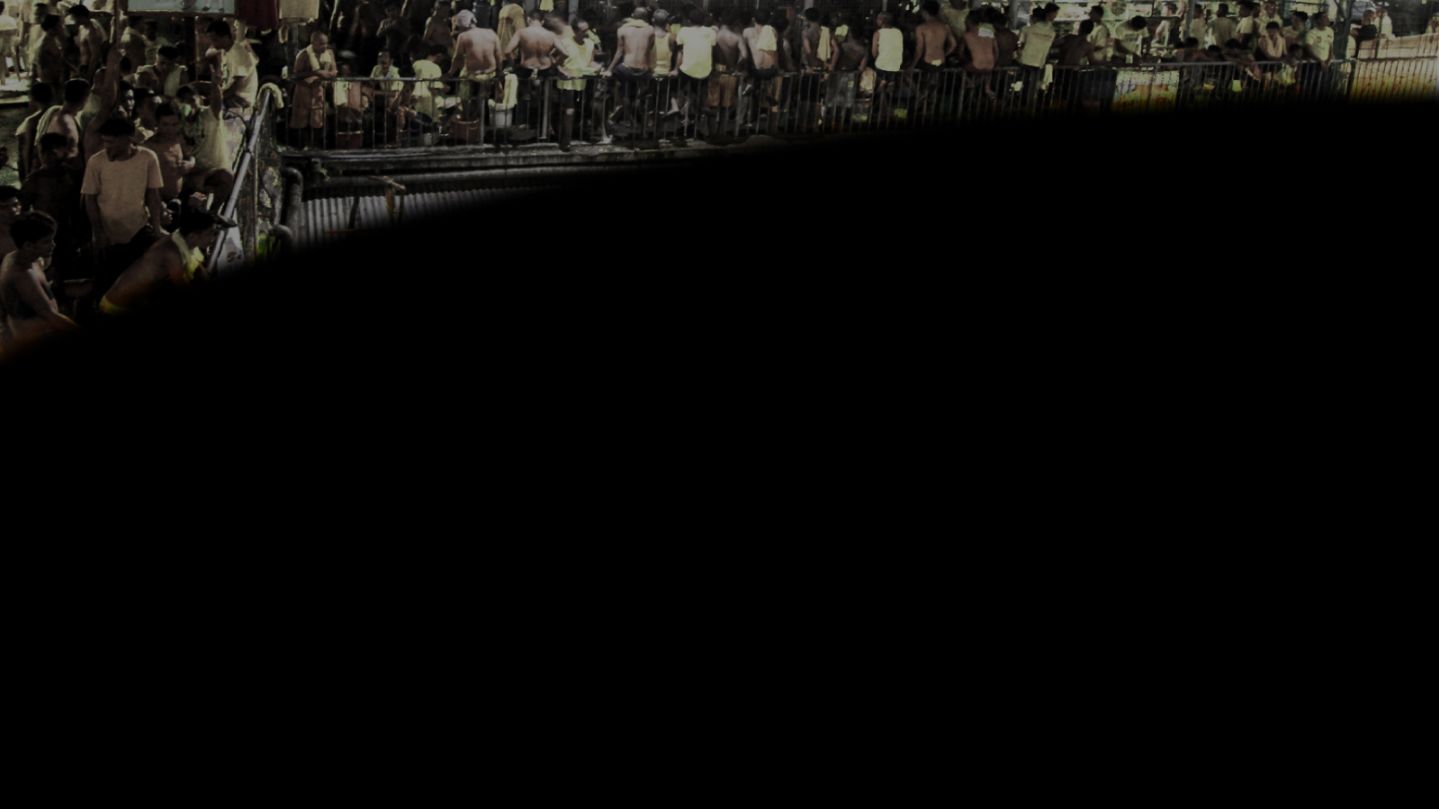Lifeless bodies lying on the streets of the Philippines are a visceral sign of new President Rodrigo Duterte’s war on drugs.
So far more than 1,900 people have died. Of those more than 700 have been killed in police operations since Duterte took office in late June, according to police statistics. Many of the unsolved deaths are attributed to vigilantes.
Duterte’s tough talk on the country’s drug and crime problems won him the election and, 60 days on from his inauguration, he remains extremely popular.
“Double your efforts. Triple them, if need be. We will not stop until the last drug lord, the last financier, and the last pusher have surrendered or put behind bars – or below the ground, if they so wish,” he said in his July 25 State of the Nation speech.
A Senate inquiry is underway into the police and the extrajudicial killings. Police Chief Ronald Dela Rosa told the committee there was no shoot to kill order, but people are happy with what the police are doing, despite mistakes by officers. “We are only human…We admit we make mistakes, we are not perfect,” he said.
Dela Rosa said that about 300 of his officers were suspected of involvement in the drug trade and would be relieved of their duties and tried in court.
But for all the plaudits, including a 91% approval rating President Duterte received for cracking down on drug dealers and addicts, there are families heartbroken, jails swamped, rehab centers overwhelmed.
CNN spent a week in Manila and met six people living and working close to the bloodstained sidewalks.
‘My God, Duterte, stop doing this!’
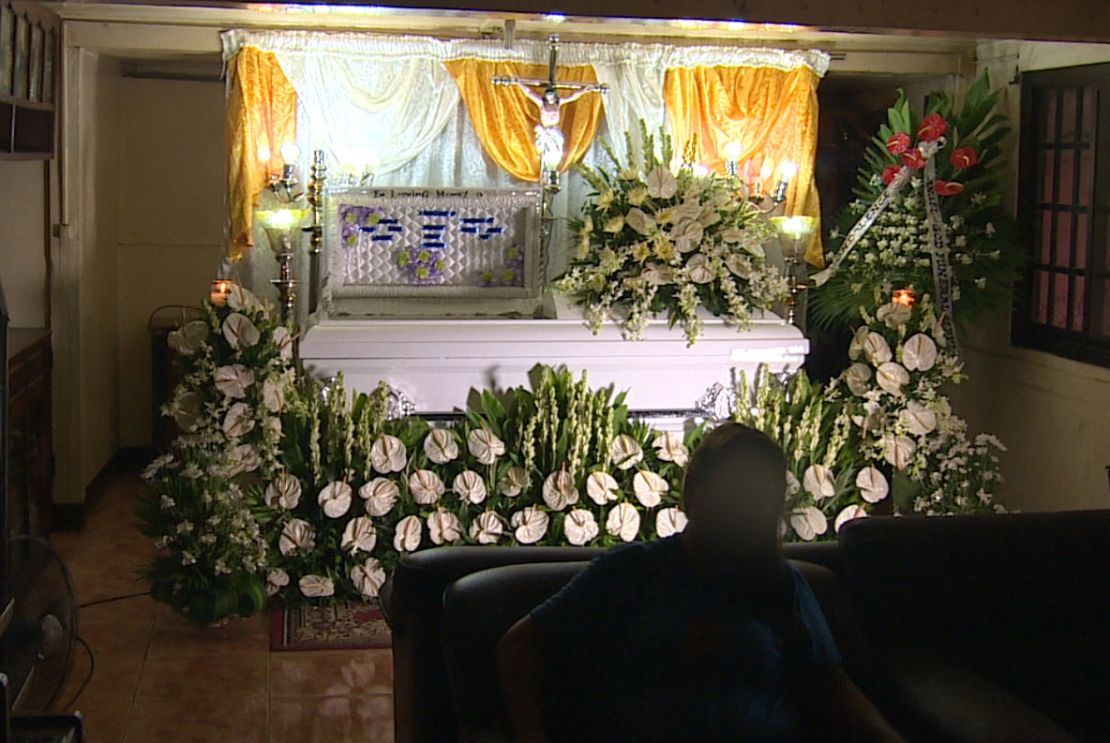
He was 47, a motor-tricycle driver who was estranged from his wife. He had two kids.
Police officers came to his house on August 14 and forced their way in, says his sister, who doesn’t want to reveal her name or her brother’s, or even the name of the town they’re from – to protect her safety. We’ll call her Janie.
“Those policemen might kill us once we spoke out the truth,” Janie tells CNN’s Ivan Watson. “I said to myself, they have the license to kill already.”
They came to his house, she says, and forced their way in.
“Handcuffed already, they shot (him in the) head.” Janie alleges they killed three other men with him.
But, a police report says, her brother, was a suspected drug dealer, and was shot and killed after he opened fire on police. His sister insists her brother was a user, not a dealer. His body is still in the funeral home when CNN meets her.
Janie says that President Duterte’s rhetoric has created a climate where the cops feel they can act without fear of retribution, official or otherwise.
“I feel afraid and very scared when I hear the president say they will kill drug users. Because we will have no justice at all,” she says.
“We can put the users in rehabilitation, right? They shouldn’t punish (them) by taking their lives.”
She says that her brother stopped using meth long ago. “My brother had no enemies. He’s a very kind person.”
The perpetrators were police officers who were involved with meth trade themselves, Janie insists.
As we speak to her, she becomes increasingly agitated. The powerlessness she feels is palpable.
“My God, Duterte, stop doing this,” she says, breaking down into sobs. “You don’t have the right to take the lives of these people.”
“Why don’t you take the lives of these policemen too? They were drug users and pushers!”
‘Knock and plead’ – On night patrol with Philippines police
‘We feel already that there’s something different in us’
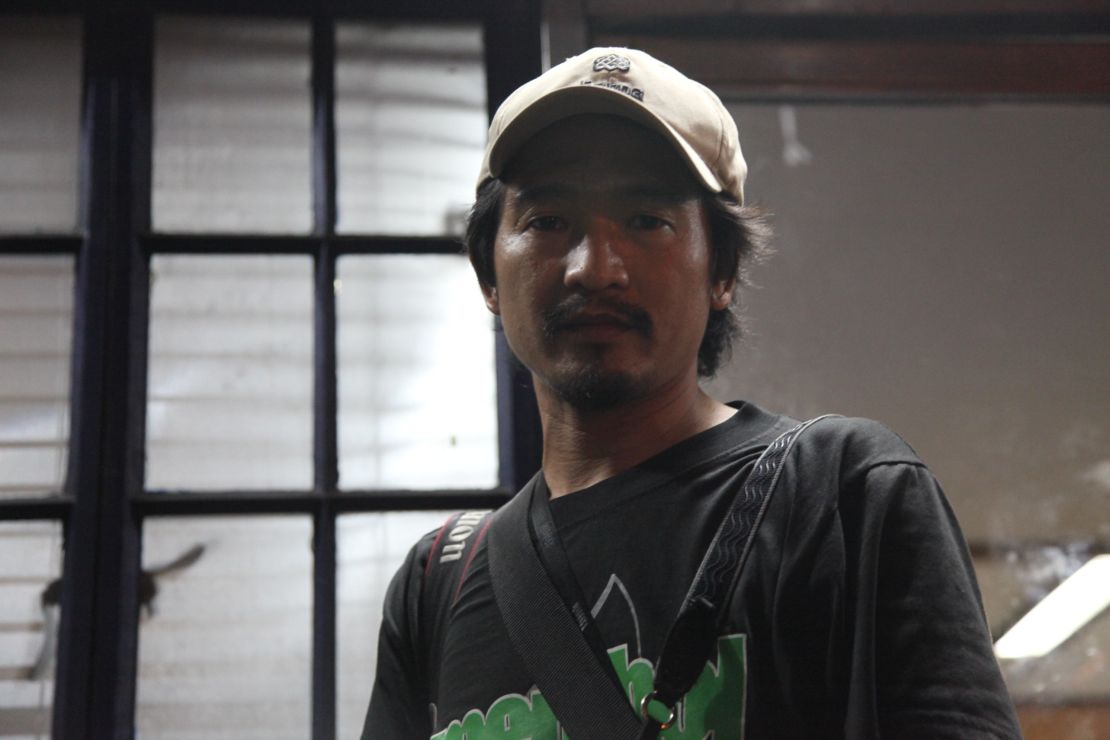
On the streets of the working class Manila neighborhood of Tondo, we find the victim face down in a trash-strewn stairwell, one of his flip flops lying meters away, in a rutted, rain-soaked alley.
There’s a small, cheap revolver next to his lifeless hand. He’s the victim of a police “buy-bust.”
Police on the scene say he got suspicious while selling drugs to an undercover officer and drew his weapon. The officer, they say, had no choice but to shoot him.
I’m out shadowing Raffy Lerma, a photographer for the Philippine Daily Inquirer, on his nightly beat. He spends night after night covering violent deaths like this one.
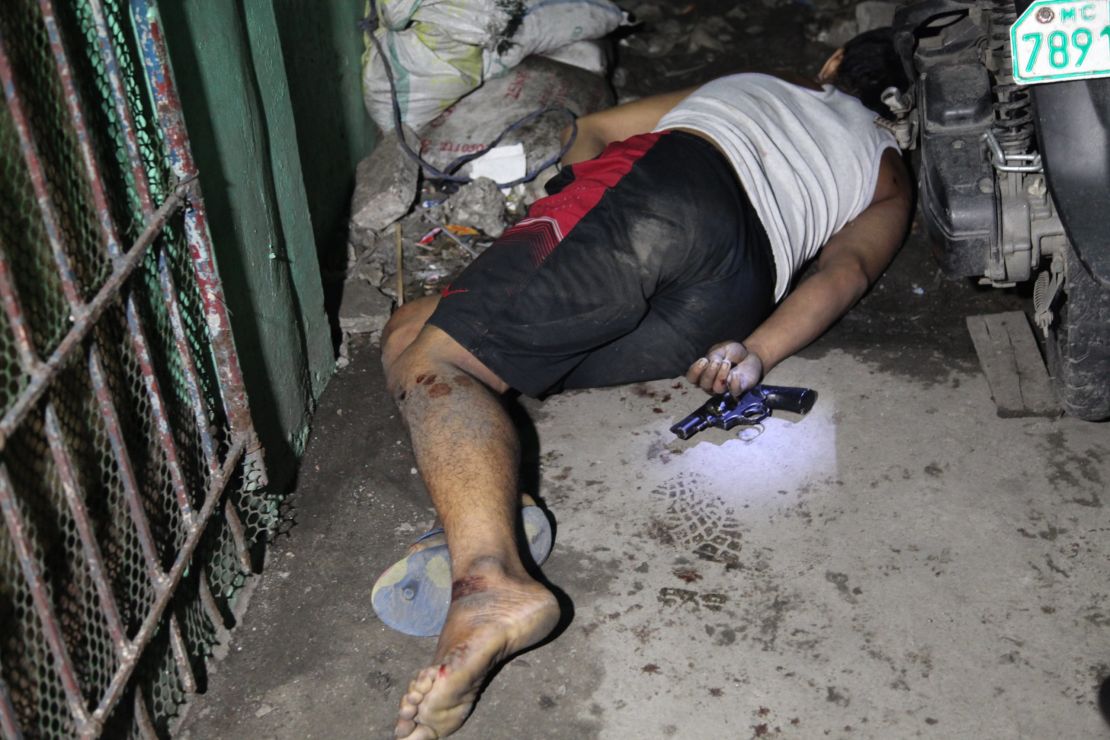
He’s best known for his image of Jennilyn Olayres, a Manila woman he photographed cradling the body of her partner, suspected drug pusher Michael Siaron.
It’s a picture that helped bring the wave of drug-related killings to international attention.
Lerma’s covered natural disasters before, with higher death tolls. But this time it’s different. “In this war we’re also witnessing the devastation of these men’s families. It’s traumatizing,” he says.
Lerma says he’s seen more deaths since President Duterte’s war on drugs began in June, than he did in an entire year covering the overnight crime beat as a rookie photographer 10 years ago.
“I want drugs to stop but not how it’s being done. I’m not for killing people,” Lerma says.
“The scary thing is that for every day that passes there will be more deaths. Can we take this for six years?” he asks, referring to the standard presidential term.
He says there are strong bonds between him and other crime beat photographers.
“We support each other mentally and emotionally. One time we didn’t cover the deaths out on the streets, we just talked; shared experiences.”
But he’s worried that it might be too late; the emotional toll already taken.
“We feel already that there’s something different in us.”
Dead or alive: Is the Philippines’ war on drugs out of control?
‘We are overwhelmed’
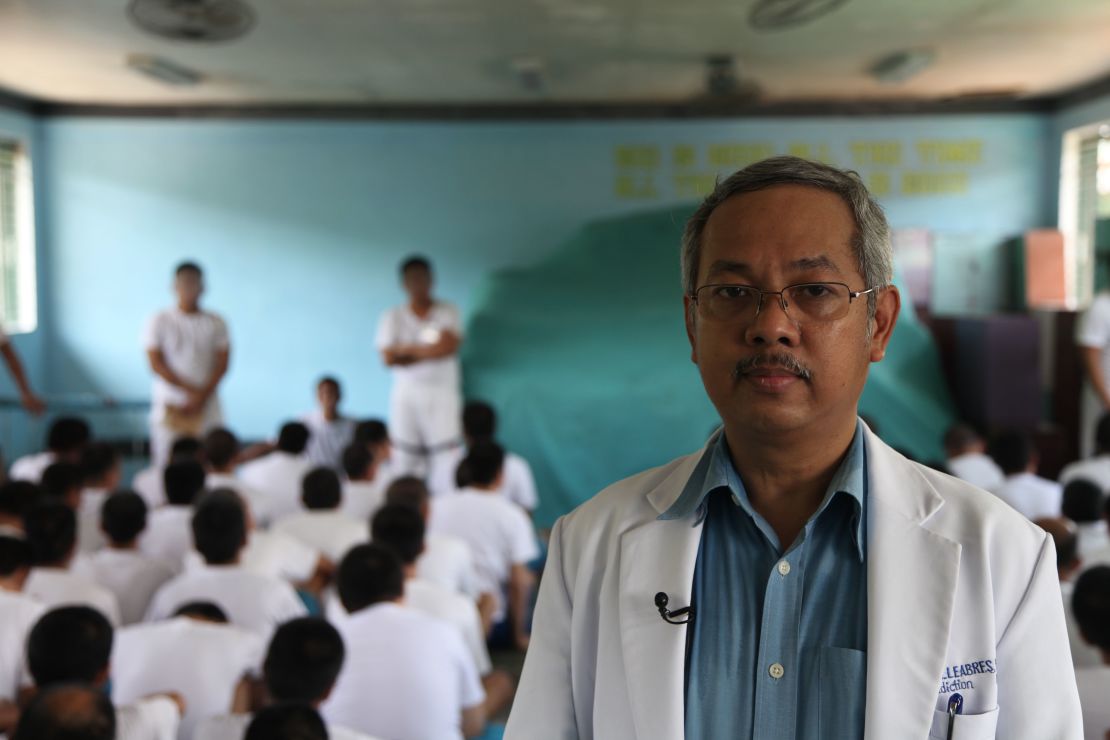
Bien Leabres is a rarity – one of fewer than 20 specialists trained in treating drug addiction in the country.
He heads up the DOH-TRC Bicutan Rehabilitation Center, the largest of only 40 public and private facilities in the country.
It has an approved capacity of 550. It currently houses 1,557.
“We are overwhelmed,” Leabres states, matter-of-factly, though he says they’ve been promised more funding.
In many of the dorms they’ve taken out the bunks, as they could only hold two patients. Now, his patients sleep crammed on rubber foam mattresses on the floor.
Sometimes 30 new patients come in each day, but at most they’re only able to discharge seven.
“Most of them are here because of fear,” he tells CNN’s Ivan Watson. “The crackdown (has) made them fear that they will be incarcerated or even worse, killed.”
He says his staff is finding the huge number of patients tough to deal with.
“We’re relying on group therapies – one-on-one counselling has drastically been affected.”
He’s pleased that addiction has become a more visible issue but the deaths, he thinks, are avoidable.
“These people are victims,” he says. “Not criminals. “
Philippines police chief: 300 dirty cops will be brought to justice
‘The things, the years that I lost’
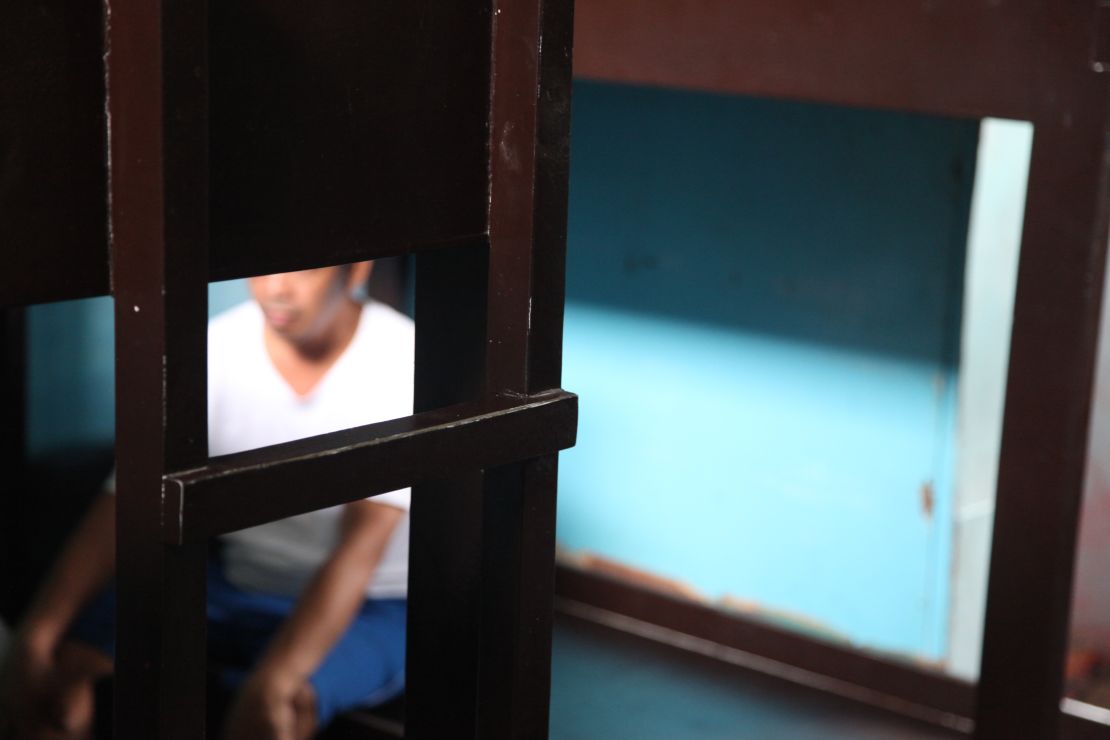
“You can call me A.R.,” he says.
He’s keen to use an alias as he doesn’t want to be identified as a drug user – anything that can link him to that murky underworld could come back and haunt him, in the form of a bullet from a vigilante – or a police officer’s – gun.
He’s a chronic meth user, classified at the DOH-TRC Bicutan Rehabilitation Center as a “drug dependent.”
Before he came in here he says he was smoking at least a gram a day of “shabu,” – the local name for meth.
Through the gaping space where his front teeth used to be, he tells me that he used almost every day for 16 years.
“The main thing is the regrets – the things, the years that I lost. When I was on the drug, it was normal to be aggressive,” he says in the local language, Tagalog, translated by a rehab center official.
He’s what Filipinos teasingly call a “nose bleed” – a local who never bothered to learn English.
The joke, which doesn’t translate terribly well, is that their noses start bleeding when they try to speak the language.
A.R. says he’s worried that, despite this six-month stint getting clean, he’ll soon fall back into his old ways when he’s out.
“The drugs are too cheap,” he says. “It’s so hard to break the loop.”
‘I’m here because of the president’
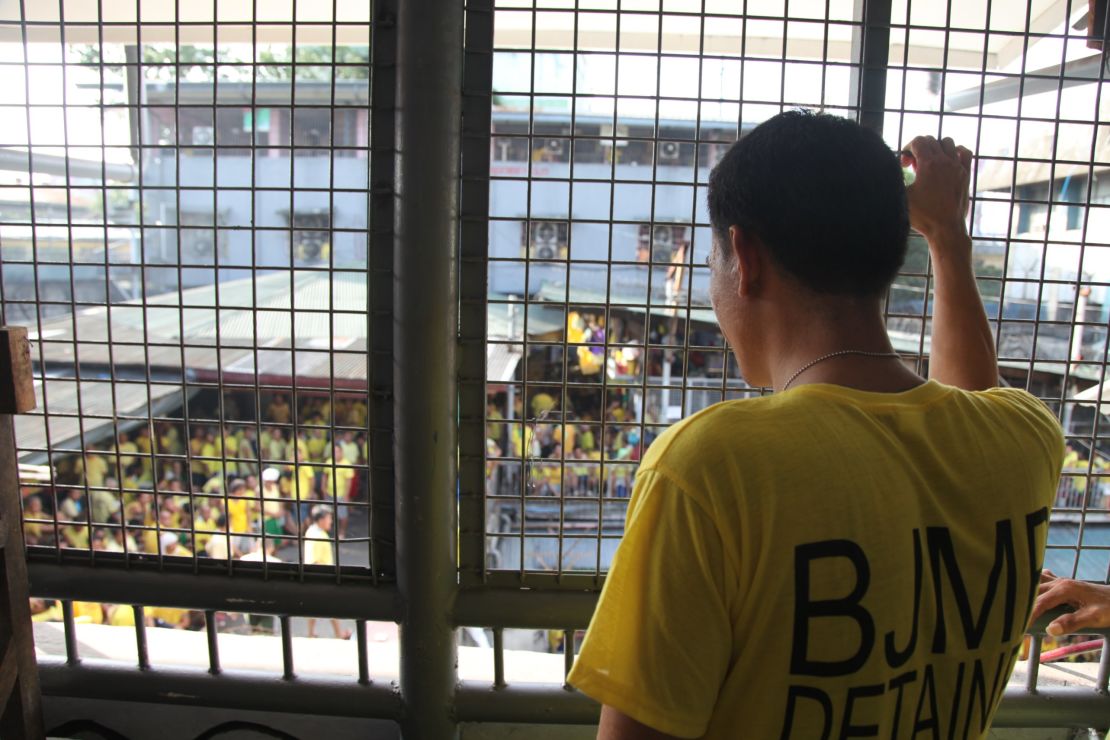
Quezon City Jail is so crowded prisoners take turns to sleep.
It’s always been busy, officials tell us, but since the war on drugs began numbers are steadily mounting.
Inmates range from shy teenagers to worn, haunted men in their eighties – over 4,000 inmates in a prison supposed to hold 800.
Alex, a 29-year-old call center worker with a pockmarked face and a crude dragon tattooed on his right arm, has been in this mass of yellow-shirted humanity for little over a month.
He was arrested for a “9165” violation – the slang used for a drugs charge. It’s the name of the drugs act enacted in 2002.
He was drunk, he says, and fighting with his wife when neighborhood officials showed up and accosted him. Alex says he only had a little shabu on him but it didn’t matter.
He was hustled away to the cops and now finds himself incarcerated, potentially for years while he waits for a court date – fighting for floor space to sleep on.
“I’m here because of the president’s (drugs) policy,” he says, through a guard’s translation.
“Before, you wouldn’t get arrested for such a small amount.”
The food is terrible, he says, grasping at the wire fence and looking out over the prison compound and its impossibly cramped conditions. Life in here is especially tough for the new guys, he adds. “It’s hard to find a place to sleep, especially when it rains.”
Life inside the Philippines’ most overcrowded jail
‘We might as well abolish our courts’
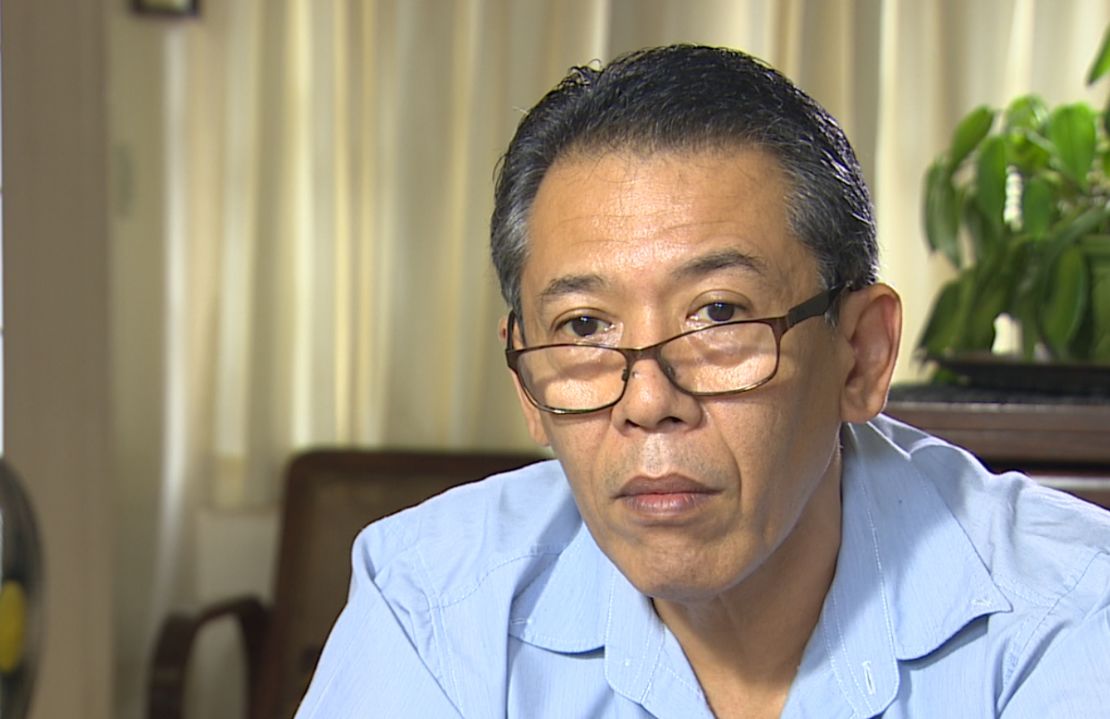
Jose Manuel “Chel” Diokno, one of the Philippines’ foremost human rights lawyers, says that under Duterte, the country is experiencing a climate of fear worse than the dark days of martial law under late dictator Ferdinand Marcos.
Back in the 1970s and 80s, enemies of the state were branded “communist,” he says.
“Now, it’s ‘drug user,’” says Diokno, the chairman of the Free Legal Assistance Group (FLAG).
“The presumption is reversed – you have to come forward (these days) and prove your innocence. It’s harder than during the Marcos years. Anything goes.”
In a nationally televised speech in June, Duterte made his feelings plain to everyone. “If (a criminal) fights, and he fights to the death, you can kill him.” He went on to say, “Please feel free to call us, the police, or do it yourself if you have the gun … you have my support.”
From a human rights perspective, Diokno says he’s “disgusted.”
He says due process is being trampled on, from the bodies of those killed in police operations, to “knock and plead” operations, where police invite suspected drug users to surrender to local authorities for registration.
The government insists these are entirely voluntary registrations. Those who register are sent to rehab. But Diokno says the procedures are in his view “warrantless arrests.”
Suspects are “made to sign documents incriminating themselves, which is a violation of our bill of rights,” he laments, arguing that many of those targeted are poor and unaware of their legal rights.
Despite repeated freedom of information requests, he says he’s seen no formal guidelines for prosecuting this bloody war on drugs.
“Law officials (are) acting as judge, jury and executioner. We might as well abolish our courts.”
Duterte: Political rival a ‘robber’ and ‘immoral woman’
CNN’s Ivan Watson, Kathy Quiano, Hilary Whiteman, Jason Kwok, Sean O’Key and Scott Clotworthy, and journalist Charie Villa contributed to this report.
